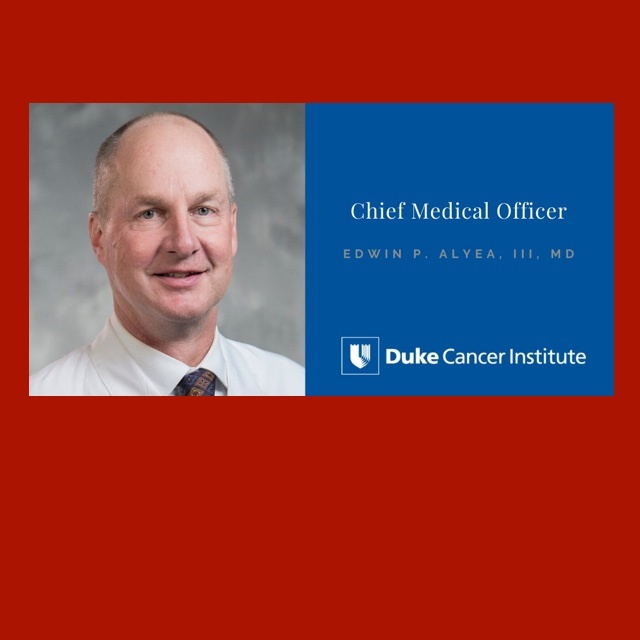After 30 years, a Dukie Comes Home
Medical oncologist Edwin P. Alyea, III, MD, has been named chief medical officer (CMO) for Duke Cancer Institute (DCI). He will also serve as a professor of Medicine in the Department of Medicine, Division of Hematologic Malignancies and Cellular Therapy. In addition, Alyea will operate a clinical practice with the Adult Blood and Marrow Transplant Program. He joined Duke on January 1. (2020)
The CMO position is a new role at DCI. As physician clinical lead, Alyea will oversee an integrated approach to the delivery of cancer services across the health system. He will be instrumental to DCI’s goal of transforming both the prevention and treatment of cancer.
“Dr. Alyea will drive the “One Duke/One DCI” practice – strengthening and advancing our commitment to safe, quality patient care,” said Michael Kastan, MD, PhD, the executive director of DCI. “We are excited to have someone of Ted’s experience and expertise to help lead coordination of cancer patient care operations and strategies across all of the components of Duke Health, including the Duke University Health System, the PDC, and the School of Medicine.”
In collaboration with oncology nursing and leadership, Alyea will provide clinical leadership for the oncology outpatient clinics and inpatient units at all DCI sites — Duke University Hospital, Duke Raleigh Hospital, Duke Regional Hospital, and all sites of community oncology practice. He will also provide clinical oversight for DCI quality initiatives, including development of quality metrics and standards for DCI physicians.
Previously, from 1996 to 2019, Alyea was a faculty member and practicing oncologist at Dana-Farber Cancer Institute (DFCI). He most recently directed Clinical Strategy for DFCI’s Hematologic Malignancies Program. Before that, he served as director of the Inpatient Oncology Service and associate director of the Stem Cell Transplantation Program for DFCI and Brigham and Women’s Hospital. From 2000 to 2017, he was the medical director of DFCI’s Physician Assistant Program.
Alyea’s research centers on adoptive immunotherapy for the treatment of hematologic diseases. Since 2005, Alyea has been a member of the Stem Cell Transplant Committee for The Alliance for Clinical Trials in Oncology (formerly known as Cancer and Leukemia Group B). He serves as vice chair of the Data Safety Monitoring Group at the Center for International Blood and Marrow Transplant Research (CIBMTR) in Minneapolis. Alyea is also an ad hoc reviewer of these journals: Blood, Biology of Blood and Marrow Transplantation, the Journal of Clinical Oncology, and The New England Journal of Medicine.
Alyea received his MD from Duke University in 1989. He completed postgraduate training in internal medicine at Brigham and Women’s Hospital, followed by a fellowship in Medical Oncology and Hematology at DFCI and Brigham and Women’s Hospital.
“When I left Duke after medical school my original plan was to go up to Boston and see something different and learn something different, and then hopefully come back to Duke and live happily ever after,” said Alyea. “It took longer than expected, only about 30 years!”
Alyea’s originally from Kentucky, but his father grew up in Durham. Alyea’s grandfather — Edwin P. Alyea, a surgical urologist — was one of the original group that founded the Duke University Medical Center. The senior Alyea was the first member of the Urology faculty — teaching from 1930 to 1969 — and for much of his career served as chief of the department.
“I used to come with my grandfather to the hospital and that’s how I was inspired to become a doctor,” said Alyea. “My grandfather would tell stories about the building of the hospital and campus in the early 1930s.”
As a medical student, Alyea was heading down the surgical route until he did a rotation in Medicine as a fourth-year medical student. Duke hematologist oncologist Wendell Ross, MD, was his attending. After a rotation with Ross, he decided he might want to specialize in blood cancer, a feeling that he said was affirmed during his fellowship in Medical Oncology and Hematology at DFCI and Brigham and Women’s Hospital.
“Coming back to Duke is like coming home in a way,” said Alyea, though he admits that saying goodbye to his patients, some of whom he’s taken care of for 25 years, was “challenging.”
Alyea said his vision for DCI’s growth includes “making sure that patients and families have a seat at the table for important decisions about how we move forward.”
“There is great expertise in many fields here and I aim to help each of these groups achieve their best,” said Alyea. “I see an incredibly dedicated staff at all levels. The ultimate goal is to make sure we continue to provide world-class cancer care and facilitate both clinical and translational research that moves the dial in cancer therapy and benefits patients.”
This article originally appeared on the Duke Cancer Institute blog on January 8, 2020.





